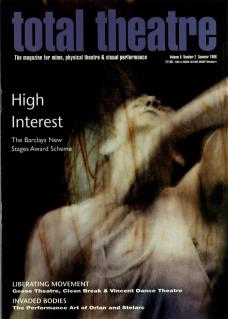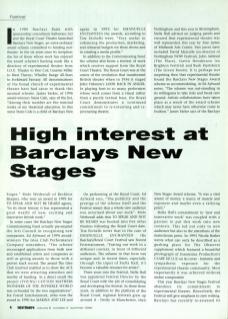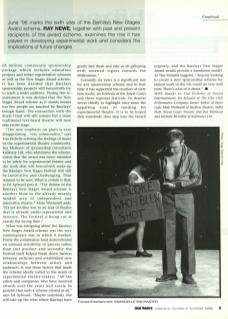June 96 marks the sixth year of the Barclays New Stages Award scheme. Ray Newe, together with past and present recipients of the award scheme, examines the role it has played in developing experimental work and considers the implications of future changes.
In 1989 Barclays Bank with sponsorship consultants Kallaways Ltd and the Royal Court Theatre launched Barclays New Stages, an extraordinary award scheme committed to funding new theatre. In the six years since its inception the list of those whose work has enjoyed the award scheme's backing reads like a directory of experimental theatre: from I.O.U. Theatre to Doo-Cot; Graeme Miller to Blast Theory; Whalley Range All-Stars to Forkbeard Fantasy. All denominations of the broad church of experimental theatre have had cause to thank this unusual scheme. James Yarker, of 1996 award-winners Stan’s Cafe, says of the list, ‘Among their number are the seminal works of my theatrical education. In this sense Stan’s Cafe is a child of Barclays New Stages.’ Mole Wetherall of Reckless Sleepers, who won an award in 1995 for To Speak and Not Be Heard agrees, ‘In its short history it has represented a great wealth of new, exciting and innovative British work.’
In some cases the Barclays New Stages Commissioning Fund actually pre-empted the Arts Council in recognising new companies. Ed Aylward of 1994 award-winners The Glee Club Performance Company remembers, ‘The scheme encouraged applications from both new and established artists and companies as well as giving awards to those with a proven track record. The award The Glee Club received enabled us to show the ACE that we were attracting attention and worthy of funding. As a direct result the project (Young) Cotton Mathers Wonders of the Invisible World was co-funded by the two organisations.’ For Forced Entertainment (who won the award in 1990 for Marina and Lee and again in 1992 for Emanuelle Enchanted), the awards, according to Tim Etchells, were, ‘Very useful in enhancing the production, marketing, and rehearsal budgets for these shows and in creating a media profile.’
In addition to the Commissioning Fund the scheme also hosts a festival of work which receives support from the Royal Court Theatre. The Royal Court was at the centre of the revolution that transformed British theatre when in 1956 it staged John Osborne's Look Back in Anger. In playing host to so many performers whose work comes from a visual rather than a purely textual base, the Royal Court demonstrates a continued commitment to reinventing and rejuvenating theatre.
On performing at the Royal Court, Ed Aylward says, ‘The publicity and the prestige of the scheme itself and the Festival meant that a whole new audience was informed about our work.’ Mole Wetherall adds that To Speak and Not be Heard was booked into five other theatres following the Royal Court date. Tim Etchells notes that in the case of Emanuelle Enchanted the Barclays / Royal Court Festival saw Forced Entertainment, ‘Putting our work in a different context, in front of different audiences. The scheme in that form was unique and, in recent times, especially through the input of Stella Hall, it's become a valuable resource for artists.’
Three years into the Festival, Stella Hall was appointed Festival Director by the Royal Court with the job of consolidating and developing the festival. In those three years, in addition to the platform of the Royal Court, regional festivals grew up around it – firstly in Manchester, then Nottingham and this year in Birmingham. Stella Hall advised on judging panels and ensured that experimental theatre was well represented, this year by Alan James of Midlands Arts Centre. Past jurors have included David Metcalfe (ex-director of Nottingham NOW Festival), John Ashford (The Place), Gavin Henderson (ex Brighton Festival), and Bush Hartshorn (The Green Room). It is perhaps not surprising then that experimental theatre found the Barclays New Stages Award scheme so accommodating. As Ed Aylward notes, ‘The scheme was outstanding in its willingness to take risks and break new ground. Artistic collaborations have taken place as a result of the award scheme which may never have otherwise come to fruition.’ James Yarker says of the Barclays New Stages Award scheme, ‘It was a vital source of money, a source of muscle and exposure and maybe even a rallying point.’
Stella Hall's commitment to 'new and innovative work’ was coupled with a passion to put this work into new contexts. This led not only to new audiences but also to the attentions of the mainstream press. In 1993 Nicola Barker wrote what can only be described as a gushing piece for The Observer supplement which featured a beautiful photograph of Insomniac Production's Clare de Luz on its cover – fantastic and sympathetic exposure for the experimental theatre community. Most importantly it was achieved without undue compromise
This year Barclays New Stages Festival abandons its commitment to experimental theatre. Henceforth, the Festival will give emphasis to new writing. Barclays has recently re-assessed its £8 million community sponsorship package which includes education projects and urban regeneration schemes as well as the New Stages Award scheme. It has been decided that Barclays sponsorship projects will henceforth try to reach a wider audience. During this reassessment it was decided that the New Stages Award scheme as it stands means too few people are touched by Barclays' benign hand. The connection with the Royal Court will still remain but a more traditional text-based theatre will now take centre stage.
‘The new emphasis on plays is very disappointing – very conservative,’ says Tim Etchells echoing the feelings of many in the experimental theatre community. Bea Malleson of sponsorship consultants Kallaway Ltd, who administer the scheme, insists that the award was never intended to be solely for experimental theatre and the work that will henceforth make-up the Barclays New Stages Festival will still be innovative and challenging. That remains to be seen. What is certain is that, as Ed Aylward puts it, ‘The demise of the Barclays New Stages Award scheme is another blow to the already meanly funded area of independent and innovative theatre.’ Mole Wetherall adds, ‘It's yet another loss to an area of theatre that is already under-represented and insecure. The Festival is being cut at exactly the wrong time.’
What was intriguing about the Barclays New Stages Award scheme was the very contemporary way in which it worked. Firstly the commission fund demonstrated an unusual sensitivity to process rather than just product and secondly the Festival itself helped break down barriers between artforms and established new relationships between artists and audiences. It was these factors that made the scheme ideally suited to the needs of experimental theatre makers. ‘All the artists and companies who have received awards over the years will surely be grateful that such a scheme existed at all.’ says Ed Aylward. ‘Maybe somebody else will take up the reins where Barclays have gently laid them and take us all galloping with renewed vigour towards the Millennium.’
Certainly six years is a significant run for any sponsorship scheme and in that time it has supported the creation of sixty new works, six festivals at the Royal Court, and three regional festivals. Its demise serves chiefly to highlight once more the appalling state of funding for experimental theatre. It is to be hoped that somebody does step into the breach urgently, and the Barclays New Stages Award would provide a handsome model. As Tim Etchells suggests, ‘Anyone looking to create a new sponsorship scheme for radical work in the UK could do very well now. There's a lot of it about.’
With thanks to Tim Etchells of Forced Entertainment, Ed Aylward of The Glee Club Performance Company, James Yarker of Stans Cafe, Mole Wetherall of Reckless Sleepers, Stella Hall, Royal Court Theatre and Bea Malleson and Michelle McGillity of Kallaways Ltd.


